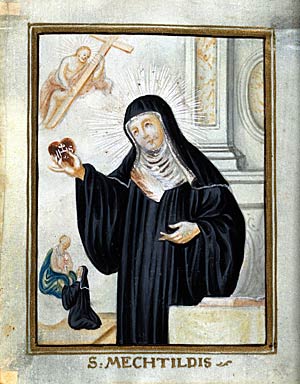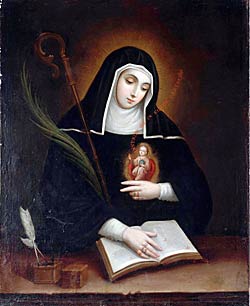Readings:
1 Samuel 1:21-28
Psalm 119:41–48
Acts 2:42-47
Luke 10:38–42Preface of a Saint (3)
PRAYER (traditional language)
Almighty God, who didst give to thy servants Mechthilde and Gertrude special gifts of grace to understand and teach the truth in Christ Jesus: Grant, we beseech thee, that by their teachings we may know thee, the one true God, and Jesus Christ thy Son, who liveth and reigneth with thee and the Holy Ghost, one God, for ever and ever. Amen.
PRAYER (contemporary language)
Almighty God, who gave to your servants Mechthilde and Gertrude special gifts of grace to understand and teach the truth in Christ Jesus: Grant that by their teachings we may know you, the one true God, and Jesus Christ your Son; who lives and reigns with you and the Holy Spirit, one God, for ever and ever. Amen.
Lessons revised at General Convention 2024.
Return to Lectionary Home Page
Webmaster: Charles Wohlers
Last updated: 21 Sept. 2024
MECHTHILDE OF HACKEBORN AND GERTRUDE THE GREAT
MYSTICS AND THEOLOGIANS, 1298 & 1302
 Mechtilde of Hackeborn (1240/1241 – 19 November 1298) was a Saxon (from what is now Germany) Benedictine nun in the monastery of Helfta. Born Matilda von Hackeborn-Wippra, in 1240 or 1241, she belonged to one of the noblest and most powerful Thuringian families; her sister was the illustrious Abbess Gertrude of Hackeborn (not to be confused with Gertrude the Great, below).
Mechtilde of Hackeborn (1240/1241 – 19 November 1298) was a Saxon (from what is now Germany) Benedictine nun in the monastery of Helfta. Born Matilda von Hackeborn-Wippra, in 1240 or 1241, she belonged to one of the noblest and most powerful Thuringian families; her sister was the illustrious Abbess Gertrude of Hackeborn (not to be confused with Gertrude the Great, below).
She was famous for her musical talents and was called the “Nightingale of Helfta”. Gifted with a beautiful voice, Mechtilde also possessed a special talent for rendering the solemn and sacred music over which she presided as domina cantrix.
Mesctilde is best known for her revelations. The Lord would say to Mechtilde: Everything you have and by which you can please me you have from me and through me. In one extraordinary vision she perceived that "the smallest details of creation are reflected in the Holy Trinity by means of the humanity of Christ, because it is from the same earth that produced them that Christ drew his humanity." At the age of 50, Mechtilde went through a grave spiritual crisis, as well as physical suffering. Much troubled, Mechthilde, first had recourse to prayer. She had a vision of Christ holding in His hand the book of her revelations, and saying: "All this has been committed to writing by my will and inspiration; and, therefore you have no cause to be troubled about it." He also told her that He wished this book to be called The Book of Special Grace, because it would prove such to many.
Mechtilde died in the Monastery of Helfta, on November 19, 1298.
more at Wikipedia
 Gertrude the Great (January 6, 1256 – c. 1302) was a German Benedictine nun, mystic, and theologian.
Gertrude the Great (January 6, 1256 – c. 1302) was a German Benedictine nun, mystic, and theologian.
Gertrude was born on the feast of the Epiphany, January 6, 1256, in Eisleben, Thuringia. At the age of four, she entered the monastery school at the monastery of St. Mary at Helfta and was confided to the care of Mechtilde (above). She received a thorough education in a range of subjects. In 1281, at the age of 25, she experienced the first of a series of visions that continued throughout her life, and which changed the course of her life. Her priorities shifted away from secular knowledge and toward the study of Scripture and theology. Gertrude devoted herself strongly to personal prayer and meditation, and began writing spiritual treatises for the benefit of her monastic sisters.
Gertrude produced numerous writings, though only some survive today. The longest survival is the Legatus Memorialis Abundantiae Divinae Pietatis (known in English today as The Herald of Divine Love or The Herald of God's Loving-Kindness. The Herald is composed of five books. Book 2 forms the core of the work, and was written by Gertrude herself. Books 3, 4, and 5 were written by another nun, or possibly more than one, during Gertrude's lifetime and probably at least in part at her dictation. Book 1 was written shortly before or after Gertrude's death as an introduction to the whole collection, likely by another Helfta nun.
more at Wikipedia